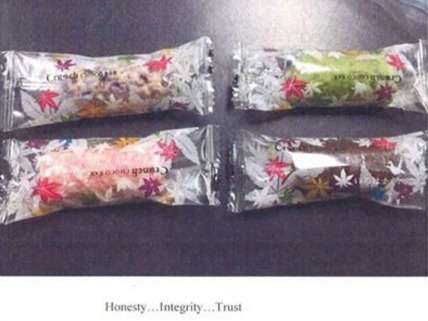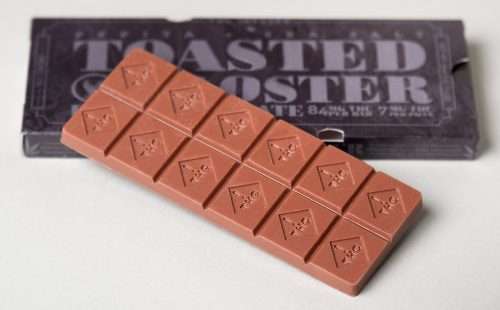Sheriff Admits He Issued a False Alarm About THC-Tainted Halloween Treats
He still implies that strangers with candy are trying to get kids high.

James Reed, the Illinois sheriff whose Halloween alert confused Crunch Choco Bars with THC-tainted treats, now admits the error, reporting that laboratory analysis contradicted a field test that supposedly showed the Japanese candy "was positive for containing cannabis." In a press release issued last week, the Bureau County Sheriff's Office says "the suspicious candy bars…were found to be imported from Japan, and the design on the wrapper is actually a Japanese Maple Leaf, which closely resembles a cannabis leaf." It adds that "there was no intention of any harm to children in this matter, and the bars have been deemed safe for consumption."
Instead of apologizing for unnecessarily scaring parents and lending credibilty to the mythical menace of marijuana-infused Halloween candy, Reed offers lame excuses. "This product, while very uncommon to our area, can be purchased online," the statement says. Yet the sheriff's office claims "we decided to adopt these precautionary measures" because "attempts to locate [the candy] on the internet were unsuccessful." It is hard to imagine what those attempts entailed, since a Google image search for "Crunch Choco Bars" immediately revealed Reed's confusion.
Despite his embarrassing mixup, Reed implies that parents still need to worry about strangers with candy who are trying to get kids high. "Sheriff Reed would like to thank everyone who took initiative to research this product and contacted us with information related to this candy," the press release says. "There are numerous products, including candies, cookies, and beverages, containing THC/cannabis that we have encountered. We are extremely relieved that this particular candy was not one of them." Far from being a close call, this incident was a completely bogus scare, a fictional example of a nonexistent phenomenon. Had Reed's warning proved accurate, it would have been the first-ever documented case of cannabis candy distributed to trick-or-treaters in the two decades since California became the first state to legalize marijuana for medical use.
Prohibitionists immediately latched onto Reed's false alarm, pointing to it as proof of a menace they had already been citing as a reason to vote against medical marijuana in Florida and recreational marijuana in Nevada. "The cruel and unfortunate incident highlights the very real dangers legal marijuana has on children," the Drug Free America Foundation declared. "These children were intentionally targeted by adults that were not their parents with the malicious intent of poisoning them." Fortunately, voters saw through this save-the-children nonsense.

In Colorado, the first state to legalize marijuana for recreational use, the supposed threat of edibles in trick-or-treat bags never materialized, but kids do occasionally consume them by mistake. Hospital visits and poison center calls involving children unintentionally exposed to marijuana rose sharply after legalization. Marijuana still accounts for a minuscule share of hospital visits and poison center calls, and the outcomes are rarely serious. The problem nonetheless has attracted a lot of political attention. While keeping kids away from marijuana edibles is mainly a parental responsibility, legislators have tried to help by requiring child-resistant packaging, warning labels, and recently implemented markings on the products themselves (see above). None of these precautions can entirely prevent accidental ingestion, but it does not happen very often. Last year there were fewer than 50 poison center calls involving kids younger than 9.
Politicians in the Aspen area recently backed away from proposals to restrict or ban edibles in the name of child protection after discovering that unintentional cannabis consumption is not as common as they had been led to believe. "The problem we talked about initially might not be as rampant as we thought," Pitkin County Sheriff Joe DiSalvo told county commissioners this week, seven months after they asked him to investigate the danger posed by edibles. "The reason it took so long was we kept looking for something we couldn't find." Comparing local edible sales to marijuana-related hospital visits involving patients 19 or younger, The Aspen Times Weekly calculated that "0.004 percent of sales led to the poisoning of a child."


Show Comments (20)